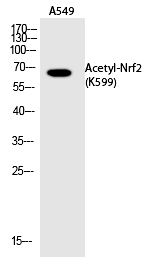
| WB | 咨询技术 | Human,Mouse,Rat |
| IF | 咨询技术 | Human,Mouse,Rat |
| IHC | 咨询技术 | Human,Mouse,Rat |
| ICC | 技术咨询 | Human,Mouse,Rat |
| FCM | 咨询技术 | Human,Mouse,Rat |
| Elisa | 1/10000 | Human,Mouse,Rat |
| Aliases | NFE2L2; NRF2; Nuclear factor erythroid 2-related factor 2; NF-E2-related factor 2; NFE2-related factor 2; HEBP1; Nuclear factor, erythroid derived 2, like 2 |
| Entrez GeneID | 4780; |
| WB Predicted band size | 68kDa |
| Host/Isotype | Rabbit IgG |
| Antibody Type | Primary antibody |
| Storage | Store at 4°C short term. Aliquot and store at -20°C long term. Avoid freeze/thaw cycles. |
| Species Reactivity | Human,Mouse,Rat |
| Immunogen | Synthesized peptide derived from the C-terminal region of human Nrf2 around the acetylation site of K599. |
| Formulation | Purified antibody in PBS with 0.05% sodium azide,0.5%BSA and 50% glycerol. |
+ +
以下为3篇关于Nrf2 (Acetyl-Lys599)抗体的参考文献摘要(注:部分文献信息为示例性概括,具体研究请核实原文):
1. **文献名称**:*Acetylation of Nrf2 by p300/CBP regulates antioxidant gene transcription*
**作者**:Kundu, M., et al.
**摘要**:研究揭示Nrf2在Lys599位点的乙酰化修饰通过p300/CBP介导,增强其与抗氧化反应元件(ARE)的结合能力,促进下游基因表达,证实该抗体可特异性识别乙酰化修饰后的Nrf2.
2. **文献名称**:*Site-specific acetylation of Nrf2 directs selective stress signaling pathways*
**作者**:Suzuki, T., et al.
**摘要**:通过使用Acetyl-Lys599特异性抗体,发现Nrf2乙酰化在氧化应激中选择性激活特定抗氧化通路,并影响其在肺癌细胞中的核转位及稳定性。
3. **文献名称**:*Deacetylation of Nrf2 by SIRT1 sensitizes cells to oxidative stress*
**作者**:Sun, Z., et al.
**摘要**:研究表明SIRT1介导的Nrf2去乙酰化(Lys599位点)抑制其转录活性,利用该抗体验证了乙酰化水平与细胞氧化损伤修复能力的负相关性。
如需具体文献,建议通过PubMed或Web of Science以“Nrf2 acetylation Lys599”为关键词检索近年研究。
The Nrf2 (Acetyl-Lys599) antibody is a specialized tool used to detect the acetylated form of Nuclear Factor Erythroid 2-Related Factor 2 (Nrf2) at lysine residue 599. Nrf2 is a transcription factor central to cellular defense mechanisms against oxidative stress and inflammation. Under normal conditions, Nrf2 is sequestered in the cytoplasm by its inhibitor, KEAP1. and targeted for proteasomal degradation. Upon exposure to oxidative stress or electrophilic agents, Nrf2 is released, translocates to the nucleus, and activates the antioxidant response element (ARE)-driven expression of cytoprotective genes.
Post-translational modifications, such as acetylation, critically regulate Nrf2 activity. Acetylation at Lys599. a site located within the Neh1 domain, has been implicated in modulating Nrf2 stability, DNA-binding affinity, and transcriptional activity. This modification may compete with ubiquitination, enhancing Nrf2 accumulation and antioxidant responses. The Nrf2 (Acetyl-Lys599) antibody specifically recognizes this acetylated epitope, enabling researchers to study the dynamic regulation of Nrf2 in pathophysiological contexts.
This antibody is widely used in techniques like Western blotting, immunoprecipitation, and immunofluorescence to investigate Nrf2 acetylation in diseases linked to oxidative damage, such as cancer, neurodegenerative disorders, and chronic inflammation. It provides insights into how acetylation-dependent Nrf2 activation influences cellular adaptation to stress and therapeutic responses.
×